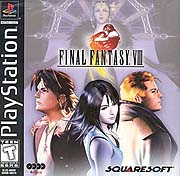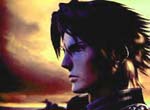 |
 FINAL FANTASY VIIIReviewed By: David LinhardtVOLUNTEER GUEST REVIEWER
Genre: Roleplaying Game (RPG) 
Welcome to one of the most extraordinary RPGs of the twentieth century. Square's “Final Fantasy 8” takes the game maker's FF (Final Fantasy) line to a whole new level with 1999's eighth installment. Fans of previous FF offerings who clamored for FF7 have reason to continue the rampage: though gameplay has changed slightly, graphics and playability have leaped. “FF8” is what most recent FF games have been: an interactive movie. You control (or watch, it often seems) a young man named Squall Leonhart. Squall, an often bitter loner, embarks on a quest that will eventually unite him with the woman of his dreams--as well as bring him face to face with a powerful enemy from the future. Six companions join Squall during his 4-CD journey. As with most FF games, the story is the game's most prominent and beautiful feature. Squall is a soldier-in-training when the game begins (with a fantastic FMV movie), bitter, quiet, and anti-social. Through a rivalry with an angry bully (Seifer, another soldier cadet) and a love-triangle involving a young sorceress (Rinoa), Squall eventually comes to terms with his own shattered past.
“FF8” focuses on the theme of love and vulnerability--Squall has and feels that he needs none as the game begins. Squall's transformation is Square's best yet; there was none of the forced “memory lapse” that we saw (and cringed at) in "Final Fantasy 7". Objectionable content places this game in the reach of most teens and above. Sexual references are mild, without the prostitution and homosexuality seen in small parts of "FF7". Language and profanity is also down too, compared to "FF7". What we do read/see is mostly PG (if played on a normal movie). The game's occult references are typical for a FF game, involving the average combat magic and new "guardian forces"; something like angels that grant temporal powers. The biggest item is probably the game's infrequent/occasionally brutal violence. During a swordfight, small wounds are exchanged; at one point Squall is tortured on an electrical rack; the villainess impales Squall with an icicle early in the game (this is not fully shown); and a girl suffocates in space (during a dream sequence). "FF8's" good points are weighty, however. Rather than embrace New Age spirituality (as “FF7” did), “FF8” focuses on service, selflessness, and love (all distinctly godly themes). The game shows consequences of selfish behavior and godly service in remarkable ways. Squall and Edea Cramer's transformations from selfish loner and crazed sorceress (respectively) to vulnerable, loving man and quiet, wise mother (respectively) adds unheard-of depth to the often shallow FF legacy. Year of Release—1999 Positive—When it comes to RPG's, Final Fantasy takes the cake. First off, if you don't have a solid grasp on reality; and can't tell the between truth and lies, then STAY FAR AWAY FROM RPG'S. Moving on, this game was good but not great, the “junction” system was very loose and Squall was not very believable when it came down to recognizing his love for Rinoa. I mean one moment he is hard core loner the next love struck softy? I think not, he should have struggled with his “old self” for at least a few minutes…or at least if he did, to show it. this, however, was not enough to mar the great things in this title to much: the artistic, almost classical feel of the futuristic environments kept it feeling like a fantasy game; the graphics are top notch for a PS title (quick note this game's graphic's are THE best of ANY PS game, period. The funny thing is Square said they could have done better if they wanted!); and an overall compelling story, a cryptic sequence near the end (!did anyone else see the FACE-LESS Squall? creepy, very creepy), and an ending that actually made me cry. Put this with the card game, hunting down the best weapons, searching for all the GF's (the must have Eden's over; yes, over; 9,999, almost 36,000, points of damaging fury), and the "OMEGA WEAPON"; an optional boss with 1,000,000 hit points that can DESTROY your ENTIRE team out in ONE shot, and you have a great gaming experience with plenty of replay value, whit only two sore spots. My Ratings: [3/4]
—David Hayes, age 20 Positive—The majority of the summonable spirits in Final Fantasy are based on a variety of mythologies. Nobody believes in these mythologies anymore. The only still-existing religion involved in this regard is Hinduism. But what the reviewer has mistaken for “New Age spirituality” is actually Shinto. This is a belief which regards all aspects of nature as sacred. The obvious and pervasive influence of it on the Final Fantasy series is not surprising when one considers the fact that Shinto is the primary religion of Japan, where Final Fantasy originates. Most Japanese people participate in more than one religion, Shinto and Buddhism primarily, but they may also have Christian beliefs. My Ratings: [5/5] Negative—I've played the Playstation and the PC versions (and the demos) numerous times. I even own the strategy guide and the full Japanese soundtrack. I like the visual style of the game, and am even artistically inspired by the FMV. The music is among the best I've heard and it fits the game very well. I didn't feel that I was getting gypped on gameplay (which was very ingenious I might add). The story was very intriguing, even if it was almost a romance. I especially enjoyed Zell because he's such a dork (or “chicken-wus” as Seifer put it). However, I am not going to say that I would recommend this game. In fact, I wouldn't recommend any Final Fantasy. Being the type of person who loves to find out a bunch of information pertaining to the real world (yes, the fallen world), I find that this game is not up to Christian standards. While it does have its points, the biggest problem is magic. This is no big surprise from something coming out of Japan. Though a lot of the magic is indeed fantastic, there is some truth that rings to the real world (such as summoning and sorcery). Perhaps a few years ago, magic in a fantasy world wouldn't bother me but now I see the light. Frankly, if you know “real” magic is bad, then wouldn't “fantasy magic” be bad as well? Just as a married man lusting after another woman in their mind is a sin, likewise pretending to use magic logically would be the same. How can you hate sin when you dwell on it in your mind? “It's not real” soon becomes a reality. Anyway, this is perhaps the mildest of the Final Fantasy series, but don't bother playing it. My Ratings: [2/5] Comments from Young People… Disclaimer: The opinions expressed in this Christian Spotlight review are those of the reviewer (both ratings and recommendations), and do not necessarily reflect the opinions of Films for Christ or the Christian Answers Network.
Christian Spotlight Guide2Games is part of Christian Answers. Copyright © Films for Christ. • “Christian Spotlight’s Guide to Games” and “Guide2Games” are service marks of Films for Christ.  |
 Along the way, we see story lines for each of the six other supporting characters play out--as well as numerous plot twists. In terms of graphics, sound, and playability, Square's rendering teams have made the PSX's final benchmark: Squall and his environment are magnificent in their texture, detail, and lighting. Japanese composers added a near-perfect soundtrack (the only downside was the annoying vocalist on the love song).
Along the way, we see story lines for each of the six other supporting characters play out--as well as numerous plot twists. In terms of graphics, sound, and playability, Square's rendering teams have made the PSX's final benchmark: Squall and his environment are magnificent in their texture, detail, and lighting. Japanese composers added a near-perfect soundtrack (the only downside was the annoying vocalist on the love song).